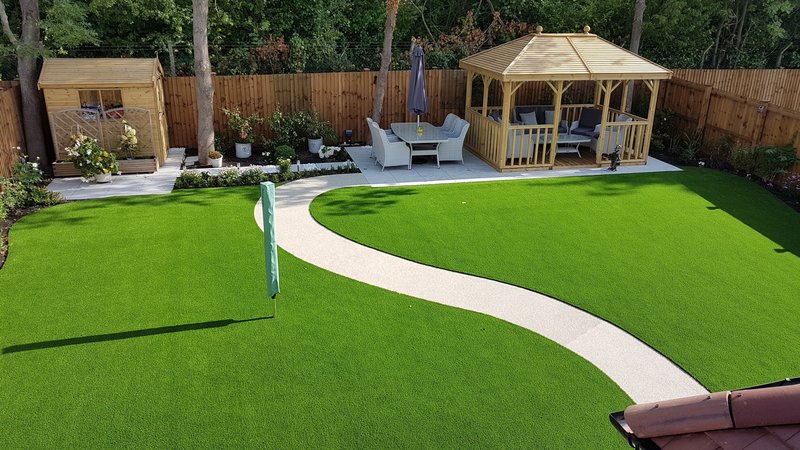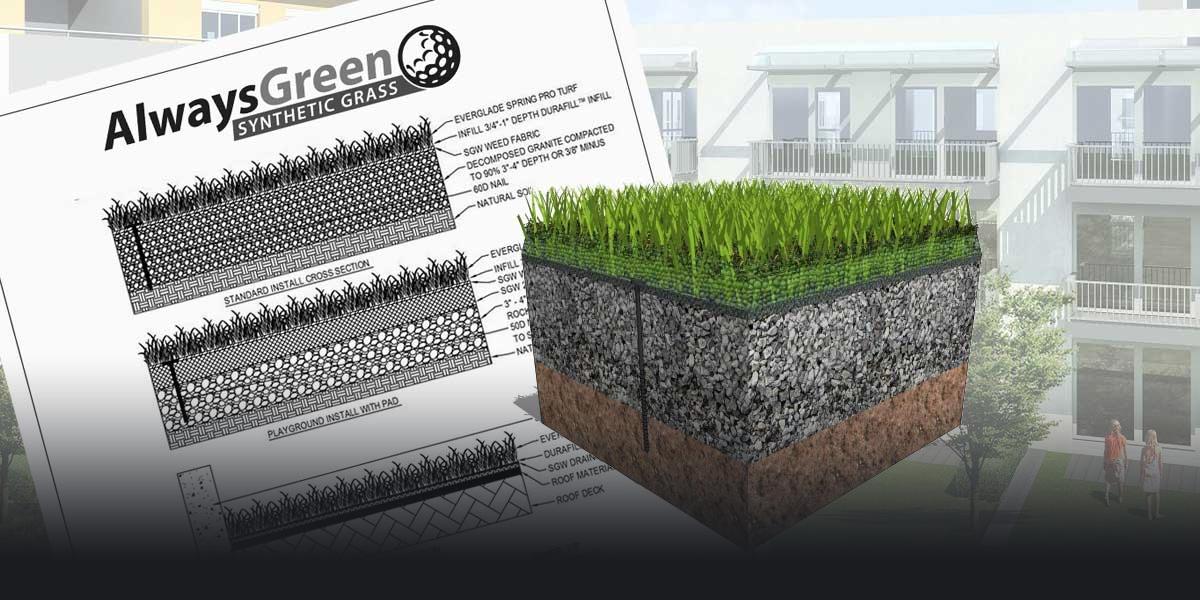Leading Factors to Think About Artificial Lawn for a Low-Maintenance and lavish Backyard
As home owners progressively look for sustainable remedies for exterior areas, fabricated lawn provides an attractive alternative to conventional grass. Its capability to maintain a vivid appearance year-round without the worries of chemical, watering, or mowing treatments makes it a functional selection for those aiming to reduce maintenance efforts. Furthermore, the environmental benefits, consisting of considerable water conservation and lowered reliance on chemicals, straighten with contemporary eco-friendly values. The benefits prolong past plain looks and sustainability; discovering the multifaceted effects of fabricated turf exposes an extensive strategy to lawn monitoring that values much deeper consideration.
Year-Round Plant
Among the most considerable benefits of artificial grass is its capability to offer year-round greenery, no matter of climate conditions. Property owners commonly encounter challenges in maintaining a vibrant grass because of seasonal modifications, droughts, or heavy rains. Artificial turf removes these concerns, making sure a consistently rich appearance throughout the year.
This artificial choice is crafted to withstand different climate situations, from sweltering summer season heat to freezing winter season temperatures. Unlike all-natural yard, which may brownish or become irregular throughout extreme problems, synthetic grass preserves its vivid shade and appearance, boosting the aesthetic charm of any landscape.
In addition, synthetic lawn is immune to bugs and diseases that commonly influence all-natural yards. This durability adds to its enduring appeal, as there is no need for chemical treatments or fertilizers that can be harmful to the environment. In addition, property owners can delight in the visual benefits of a properly maintained lawn without the cyclical difficulties postured by natural turf treatment (artificial grass installation).
Reduced Upkeep Efforts
Man-made lawn dramatically lowers upkeep initiatives, enabling property owners to take pleasure in a beautiful grass without the taxing jobs related to natural yard treatment. One of one of the most notable benefits of artificial grass is the removal of routine mowing. Without any demand for a lawnmower, homeowners save both time and the price of maintenance connected with this devices.

Cleaning up man-made grass is simple; a simple rinse with a pipe or the periodic cleaning to remove particles is typically enough - artificial grass canoga park. This convenience of treatment allows house owners to spend even more time appreciating their exterior rooms as opposed to struggling over them. In summary, the lowered upkeep initiatives related to fabricated yard make it an attractive option for those looking for a gorgeous, hassle-free yard
Water Preservation Advantages
The considerable decrease in maintenance efforts related to man-made grass includes water preservation, making it an environmentally pleasant alternative for homeowners. Traditional lawns call for significant amounts of water to remain vivid and lush, usually bring about excessive water usage, particularly in dry areas. In contrast, fabricated yard eliminates the requirement for routine watering, considerably reducing the total water usage in your backyard.
By choosing for artificial lawn, property owners can save countless gallons of water yearly. This shift not only advantages individual homes yet additionally adds to more comprehensive ecological efforts focused on lowering water waste. In areas experiencing water deficiency, the adoption of fabricated grass can play a considerable function in mitigating the impacts of drought and ensuring that valuable water resources are made use of much more effectively.
Furthermore, the installment of artificial lawn can help reduced municipal water demand, profiting the community all at once. With growing understanding of environmental issues, picking artificial grass acts as a positive action towards sustainable landscape design, aiding to preserve natural water sources while preserving a visually pleasing exterior area (backyard artificial grass). In summary, fabricated turf provides a compelling service for check out here water preservation, aligning environmental duty with modern landscape design demands

Parasite and Allergic Reaction Decrease
A substantial advantage of installing synthetic grass is its capacity to minimize bugs and allergens in outdoor areas. Standard lawn yards often act as reproducing premises for bugs such as insects, ticks, and ants, which can develop discomfort and health and wellness threats for family pets and family members. In contrast, artificial turf eliminates the organic material that draws in these bugs, therefore substantially decreasing their populations in your yard.
Moreover, all-natural grass can nurture mold, pollen, and various other allergens, which can activate allergic reactions and respiratory system problems for sensitive individuals. Synthetic turf provides a cleaner atmosphere, reducing the potential for allergenic reactions. Unlike all-natural yard, fabricated turf does not generate pollen, making it an outstanding alternative for allergy sufferers seeking to enjoy their outdoor rooms without the danger of flare-ups.
Furthermore, the go to my blog lack of dirt in synthetic grass means there is less dust and dust, further minimizing airborne irritants. This low-maintenance alternative not only enhances the aesthetic appeal of your lawn yet likewise promotes a much healthier exterior atmosphere, enabling households to enjoy their yards without the consistent worry of allergens and parasites. Hence, artificial yard is a critical choice for those focusing on convenience and health and wellness in their outdoor space.
Long-Term Expense Cost Savings
Spending in artificial grass can cause considerable long-term cost financial savings for home owners. While the preliminary investment might appear substantial, the financial benefits in time can be considerable. Artificial grass gets rid of the requirement for routine yard maintenance expenditures, such as mowing, feeding, and watering. Conventional grass typically require significant resources to maintain a rich look, particularly in locations vulnerable to drought or extreme climate condition.
Moreover, the longevity of artificial lawn even more boosts its cost-effectiveness. The majority of high-quality man-made lawn items can last 15 to 25 years with marginal upkeep, decreasing the need for substitute or considerable repairs. In contrast, all-natural lawn might need frequent reseeding and routine care, which can promptly add up in costs.
Utility financial savings are an additional vital variable. House owners can anticipate to see lower water costs, as artificial grass does not call for watering. Furthermore, the reduction in grass care solutions can liberate beneficial time and sources, enabling home owners why not find out more to designate their spending plans elsewhere.
Verdict
In recap, fabricated turf offers countless advantages for home owners looking for a low-maintenance and vibrant landscape. Its ability to offer year-round plant, combined with lowered upkeep efforts and substantial water conservation, makes it an appealing selection. In addition, the decrease of pests and irritants adds to a healthier exterior atmosphere. Eventually, the lasting cost financial savings connected with synthetic grass solidify its standing as a practical and lasting option for boosting outside areas.
Fabricated grass dramatically reduces maintenance efforts, permitting home owners to appreciate an excellent lawn without the taxing tasks associated with natural turf care.The significant reduction in upkeep efforts linked with fabricated grass prolongs to water conservation, making it an ecologically pleasant option for home owners. In comparison, synthetic yard eliminates the demand for routine watering, drastically minimizing the general water usage in your lawn.
In areas experiencing water scarcity, the adoption of artificial yard can play a substantial duty in alleviating the impacts of drought and making certain that important water sources are utilized much more efficiently.
With expanding recognition of ecological issues, choosing synthetic grass offers as a positive action in the direction of sustainable landscape design, aiding to protect natural water resources while maintaining a visually pleasing exterior area.
 Jennifer Grey Then & Now!
Jennifer Grey Then & Now! Alana "Honey Boo Boo" Thompson Then & Now!
Alana "Honey Boo Boo" Thompson Then & Now! Andrea Barber Then & Now!
Andrea Barber Then & Now! Nancy McKeon Then & Now!
Nancy McKeon Then & Now! Rossy de Palma Then & Now!
Rossy de Palma Then & Now!